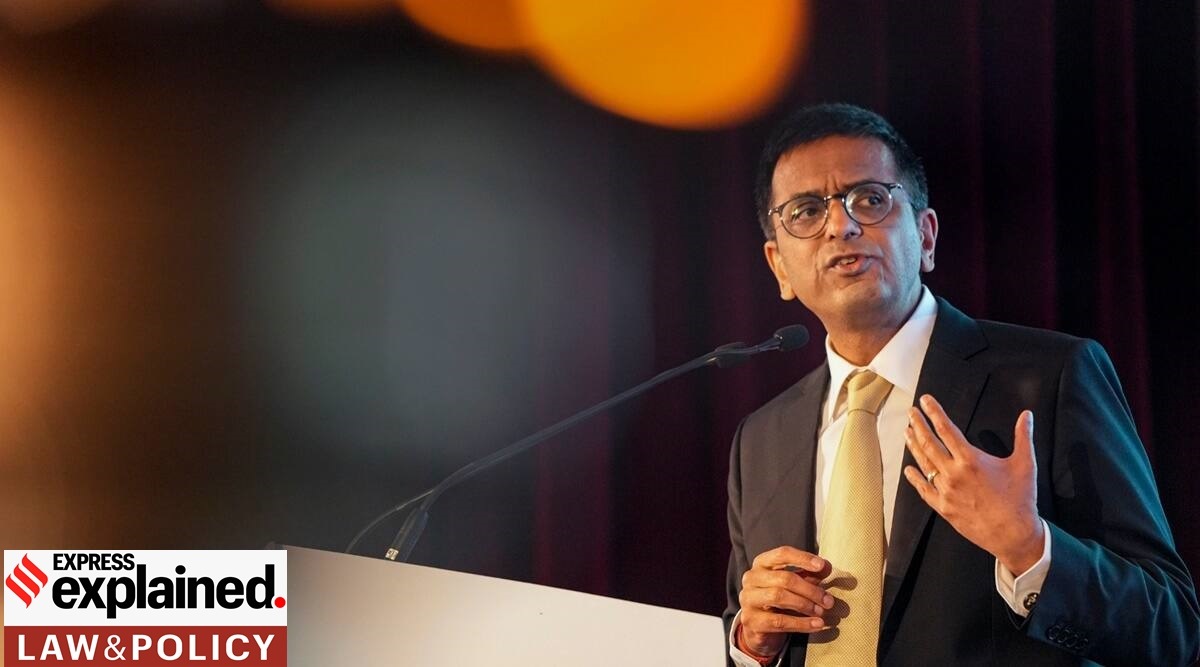Citizenship, corruption, reservation: three major cases before CJI-led SC Bench
Is Assam Accord clause constitutionally sound? Can SC-ST reservations in Lok Sabha continue? Is a lawmaker who takes a bribe to vote in the House immune from prosecution?
 The five-judge Constitution Bench will be headed by Chief Justice of India D Y Chandrachud. (File)
The five-judge Constitution Bench will be headed by Chief Justice of India D Y Chandrachud. (File) The Supreme Court has constituted a new five-judge Constitution Bench to hear three important cases. The Bench will be headed by Chief Justice of India (CJI) D Y Chandrachud, and will include Justices A S Bopanna, M M Sundresh, J B Pardiwala, and Manoj Misra.
The cases before this Bench range from a challenge to the constitutional validity of Section 6A of The Citizenship Act, 1955, to the extension of reservations in Lok Sabha and state legislatures for the Scheduled Castes (SCs) and Scheduled Tribes (STs).
The question of legal immunity enjoyed by MPs and MLAs from being prosecuted for offences such as offering or accepting bribes for casting votes will also be decided.
These are the three cases.
Assam Public Works vs. Union of India & Ors.
The question under scrutiny in this case is whether Section 6A of The Citizenship Act, 1955, suffers from any constitutional infirmity.
This section was introduced in the 1955 law in 1985 after the signing of the Assam Accord between the Government of India and the leaders of the Assam movement including former Chief Minister Prafulla Kumar Mahanta. Section 6A describes “Special provisions as to citizenship of persons covered by the Assam Accord”.
The section says that all those who came to Assam on or after January 1, 1966, but before March 25, 1971, from the specified territory — which includes all territories of Bangladesh at the time of commencement of the Citizenship (Amendment) Act, 1985 — and since then are residents of Assam, must register themselves under specified rules for citizenship.
The plea challenging this provision was filed by a Guwahati-based civil society group called the Assam Sanmilita Mahasangha in 2012. It contended that Section 6A is discriminatory, arbitrary, and illegal on account of providing different cut-off dates for regularising illegal migrants entering Assam and other parts of the country.
Ashok Kumar Jain vs. Union of India and Ors.
In this case, the Bench will deal with a challenge to the validity of The Constitution (79th Amendment) Act, 1999, which allowed reservations given to SCs, STs, and Anglo-Indians in Lok Sabha and state legislative assemblies to be extended beyond the earlier 10-year period, as provided under Article 334 of the Constitution.
Article 334 deals with the reservation of seats and special representation in Lok Sabha and Assemblies. Although it was initially meant to continue for a period of 10 years, subsequent amendments like The Constitution (95th Amendment) Act, 2009, extended reservations to groups like the Anglo-Indians, SCs, and STs for 70 years and 80 years, respectively.
However, on January 21, 2020, by way of The Constitution (104th Amendment) Act, 2019, reservations were extended to SCs and STs for 80 years again, but the reservations for the Anglo-Indian groups were discontinued.
Last year, on August 24, the top court listed the matter for consideration by a five-judge Bench led by CJI D Y Chandrachud. The case can be expected to be finally taken up now.
Sita Soren v. Union of India
In this case, the court has to decide whether Article 194 (2) of the Constitution confers any immunity on the Members of the Legislative Assembly from being prosecuted in a criminal court for an offence involving the offering or acceptance of a bribe.
Article 194 (2) states, “No member of the Legislature of a State shall be liable to any proceedings in any court in respect of anything said or any vote given by him in the Legislature or any committee thereof, and no person shall be so liable in respect of the publication by or under the authority of a House of such a Legislature of any report, paper, votes, or proceedings.”
The case arose out of a plea filed by Sita Soren, a member of the Jharkhand Mukti Morcha (JMM), who was accused of accepting a bribe to cast her vote for a certain candidate in the Rajya Sabha elections of 2012.
The Central Bureau of Investigation (CBI) filed a chargesheet against her for allegedly accepting a bribe to cast the vote. Soren contended she was protected by the immunity granted to her by Article 194(2), but her plea was rejected by Jharkhand High Court in 2014. This led her to petition the top court against the High Court’s order.
On March 7, 2019, a three-judge Bench of the SC cited a Constitution Bench ruling in P V Narasimha Rao v. State, wherein the court had ruled that under the Constitution, parliamentarians were entitled to immunity against criminal prosecution concerning their speech and votes in the House.
Following this, the Bench referred the matter to a larger five-judge Bench.
- 01
- 02
- 03
- 04
- 05






































